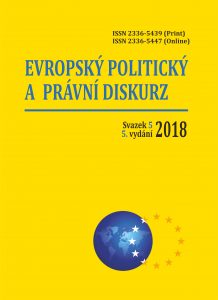DOI: 10.46340/eppd.2025.12.4.1
Volodymyr Lysyk
PhD in Law, Department of International Law, Ivan Franko National University of Lviv, Lviv, Ukraine
How to cite: Lysyk, V. (2025). The Common Philosophical Foundations of International Humanitarian Law and Human Rights Law. Evropský politický a právní diskurz, 12, 4, 5-11. https://doi.org/10.46340/eppd.2025.12.4.1
Abstract
This article explores the relationship between international humanitarian law (IHL) and international human rights law (IHRL), arguing that their current convergence reflects a return to shared philosophical and historical roots. It traces the principles of humanity and respect for human dignity to ancient moral, religious, and philosophical traditions, including early norms in ancient civilizations, Christian and Islamic thought, and Stoic philosophy. The article emphasizes that the true historical breakthrough was not the creation of these principles but their gradual extension from limited groups to a universal standard, forming the basis of modern international law.
It then examines how these ethical ideas evolved into a systematic legal framework during the Enlightenment, shaped by thinkers such as Hugo Grotius, Emmerich de Vattel, and Jean-Jacques Rousseau, and later reflected in key documents like the French Declaration of the Rights of Man and of the Citizen. In the nineteenth century, their codification in the Lieber Code and the Geneva and Hague Conventions marked the formal embedding of humanitarian and human rights principles in international law.
The article also discusses the artificial division of IHL and IHRL in the mid-twentieth century, viewing it as a result of Cold War politics rather than a fundamental contradiction. Today, this divide is narrowing, as international courts such as the International Court of Justice and the European Court of Human Rights increasingly interpret the two regimes in harmony.
Recognizing their common origins, the article concludes, is essential for applying IHL and IHRL in a complementary way, reinforcing protection, filling legal gaps, and advancing their shared purpose: safeguarding human dignity in all circumstances.
Keywords: International Humanitarian Law, IHL, International Human Rights Law, IHRL, human dignity, principle of humanity, philosophical foundations, convergence, lex specialis, Martens Clause, international courts.
References
International Court of Justice (2005). Armed Activities on the Territory of the Congo (Democratic Republic of the Congo v. Uganda). Reports 168. https://www.icj-cij.org/case/116
Bederman, D.J. (2001). International Law in Antiquity. Cambridge University Press. https://catdir.loc.gov/catdir/samples/cam031/00033672.pdf
Cicero, M.T. (1913). De officiis. Harvard University Press. https://archive.org/details/deofficiiswithen00ciceuoft/page/n9/mode/2up
de Vattel, E. (1797). The Law of Nations; or, Principles of the Law of Nature, Applied to the Conduct And Affairs Of Nations And Sovereigns. Abraham Small. http://files.libertyfund.org/files/2246/Vattel_1519_EBk_v6.0.pdf
National Assembly of France (1789). Declaration of the Rights of Man and of the Citizen. https://constitutionnet.org/sites/default/files/declaration_of_the_rights_of_man_1789.pdf
UK Parliament (1689). Bill of Rights. An Act Declaring the Rights and Liberties of the Subject and Settling the Succession of the Crown.
https://www.parliament.uk/about/living-heritage/evolutionofparliament/parliamentaryauthority/revolution/ collections1/collections-glorious-revolution/billofrights
Swiss Federal Archives (1864). Geneva Convention for the Amelioration of the Condition of the Wounded in Armies in the Field.
https://ihl-databases.icrc.org/en/ihl-treaties/gc-1864
ICRC (1929). Geneva Convention Relative to the Treatment of Prisoners of War.
https://ihl-databases.icrc.org/en/ihl-treaties/gc-pow-1929
ICRC (1949). Geneva Conventions. https://www.icrc.org/sites/default/files/external/doc/en/assets/files/publications/icrc-002-0173.pdf
Grotius, H. (2005). The Rights of War and Peace (Original Work Published 1625). https://oll.libertyfund.org/titles/grotius-the-rights-of-war-and-peace-2005-ed-vol-1-book-i
ICRC (1899). Convention (II) with Respect to the Laws and Customs of War on Land and its annex: Regulations concerning the Laws and Customs of War on Land.
https://ihl-databases.icrc.org/en/ihl-treaties/hague-conv-ii-1899
ICRC (1907). Hague Convention (IV) respecting the Laws and Customs of War on Land and its annex: Regulations concerning the Laws and Customs of War on Land.
https://ihl-databases.icrc.org/en/ihl-treaties/hague-conv-iv-1907
HUDOC (2014). Hassan v. The United Kingdom. https://hudoc.echr.coe.int/fre#{“itemid”:[“001-146501”]}
ICRC (1863). Instructions for the Government of Armies of the United States in the Field.
https://ihl-databases.icrc.org/en/ihl-treaties/liebercode-1863
ICRC (2016). Commentary on the First Geneva Convention: Convention (I) for the Amelioration of the Condition of the Wounded and Sick in Armed Forces in the Field.
https://ihl-databases.icrc.org/en/ihl-treaties/gci-1949/article-1/commentary/2016
Khadduri, M. (1955). War and Peace in the Law of Islam. Clark, New Jersey: The Lawbook Exchange. https://archive.org/details/warpeaceinlawofi0000khad
Lysyk, V., & Shperun, K. (2024). UN Practice in Protecting Human Rights During Armed Conflicts.
Evropský politický a právní diskurz [European Political and Law Discourse], 11(4), 16-26.
https://doi.org/10.46340/eppd.2024.11.4.2 .
Morsink, J. (1999). The Universal Declaration of Human Rights: Origins, Drafting and Intent. University of Pennsylvania Press.
https://www.scirp.org/reference/referencespapers?referenceid=1052642
International Criminal Tribunal for the former Yugoslavia (1995). Prosecutor v. Tadić, Case No. IT-94-1-I, Decision on the Defence Motion for Interlocutory Appeal on Jurisdiction. https://www.icty.org/x/cases/tadic/acdec/en/51002.htm
United Nations (1977). Protocol Additional to the Geneva Conventions of 12 August 1949, and relating to the Protection of Victims of International Armed Conflicts (Protocol I). https://www.ohchr.org/en/instruments-mechanisms/instruments/protocol-additional-geneva-conventions-12-august-1949-and
Rousseau, J. J. (1968). The Social Contract. Penguin Books (Original work published 1762). https://www.penguin.co.uk/books/34857/the-social-contract-by-jean-jacques-rousseau-trans-maurice-cranston/9780140442014
Singh, M. P. (2021). The Constitutional Law of India. Oxford University Press.
ICRC (1868). Declaration Renouncing the Use, in Time of War, of Explosive Projectiles Under 400 Grammes Weight.
https://ihl-databases.icrc.org/en/ihl-treaties/st-petersburg-decl-1868
The U.S. National Archives and Records Administration (1776). The Declaration of Independence.
https://www.archives.gov/founding-docs/declaration-transcript
Ticehurst, R. (1997). The Martens Clause and the Laws of Armed Conflict. International Review of the Red Cross, 37(317), 125-134. doi:10.1017/S002086040008503X
United Nations (1948). Universal Declaration of Human Rights (Resolution 217 A). https://www.un.org/en/development/desa/population/migration/generalassembly/docs/globalcompact/ A_RES_217(III).pdf
Weeramantry, C. G. (1997). Justice Without Frontiers: Furthering Human Rights. Martinus Nijhoff Publishers, 1.
https://brill.com/display/title/10297



